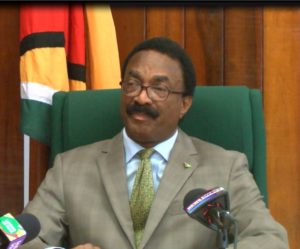…following civil society uproar over sedition clause
Following much controversy, the contentious proposed cybercrime legislation was sent back to Cabinet for Government to relook at the sedition clause, according to Legal Affairs Minister Basil Williams.
Attorney General Williams on Wednesday said that after there has been much controversy in relation to Section 18 (1) of the Cyber Crimes Bill of 2016, the Bill will be returned to Cabinet for it to decide the way forward. Section 18 (1) speaks to charging persons utilising cyberspace to register their dissatisfaction with the Government of the day.
Section 18 (1) states: “A person commits an offence of sedition if the person, whether in or out of Guyana, intentionally publishes, transmits or circulates by use of a computer system or any other means, a statement or words, either spoken or written, a text, video, image, sign, visible representation, or other thing that brings or attempts to bring into hatred or contempt, or excites or attempts to excite disaffection towards the Government established by law in Guyana; advocates the use, without authority of law, of force as a means of accomplishing a governmental change within Guyana,” among other things.


Williams first read the Bill on August 4, 2016, and it was sent to a Special Select Committee, where it stayed for two years and came back to the National Assembly unchanged. After it came back to the National Assembly, the contents created quite an uproar, since it was perceived that freedom of expression was being stifled by the legislation.
Since the controversy, Public Security Minister Khemraj Ramjattan and Williams both signalled their support for the clause saying it aimed to protect the State.
“I support the contentions of the Vice President Khemraj Ramjattan that the State has to protect itself…the law exists already and look at Clause 23 (of the Cyber Crimes Bill) it is a sweep-all clause; what it says is that all offences are offences if occasioned in cyber[space],” Williams said.
Meanwhile, President David Granger said he would adopt the position of Cabinet, but Alliance For Change (AFC) Leader Raphael Trotman outright declined to support the legislation in its current form. He stated that many within the party share his view, and revealed that if the section is not amended, then he, along with other AFC parliamentarians, would have to vote against it.
Speaking to this, Williams said Trotman was entitled to his opinion, but whatever Cabinet decided, they would have to abide by.
“I will take it to Cabinet and they will have a look at it. The matter was in the Special Select Committee and I think what happened is that Jagdeo is the only one in his party who is against that provision,” he said.
“We are in a coalition and we work out our difficulties and when you go into Cabinet whatever decision [it] takes will have to suffice…Cabinet is Cabinet; it’s collective responsibility unless you want to leave the Cabinet; you can have your own opinion, you can say you are going against the Cabinet…is going all the time you going,” Williams added.
His colleague Ramjattan, who is also the Chairman of the AFC, last week told a news conference that, despite concerns raised by some members of the party’s leadership and the public uproar regarding Section 18 (1) of the Cyber Crimes Bill of 2016, he is leading the charge to keep the offence of sedition on the books.
“Unless we want to do a major overhaul of your Criminal Offences Act and abolish sedition, then that’s fine; but as I am advised, and I am leading the charge for maintaining it in our books for very good reasons,” Ramjattan said.
Meanwhile, Opposition Leader Bharrat Jagdeo has said that Clause 18 was reminiscent of the old National Security Act, which was upheld during the Burnham era, but was repealed in the late 90s. “The insertion by the Government of Guyana of (this) provision in the cybercrime bill could mean or could have grave implications for freedom of speech in Guyana. In fact, looking at the provision or that specific provision of the Bill, which was inserted in the Special Select Committee, is reminiscent of the old National Security Act that obtained in the period of undemocratic rule,” the Opposition Leader said.



